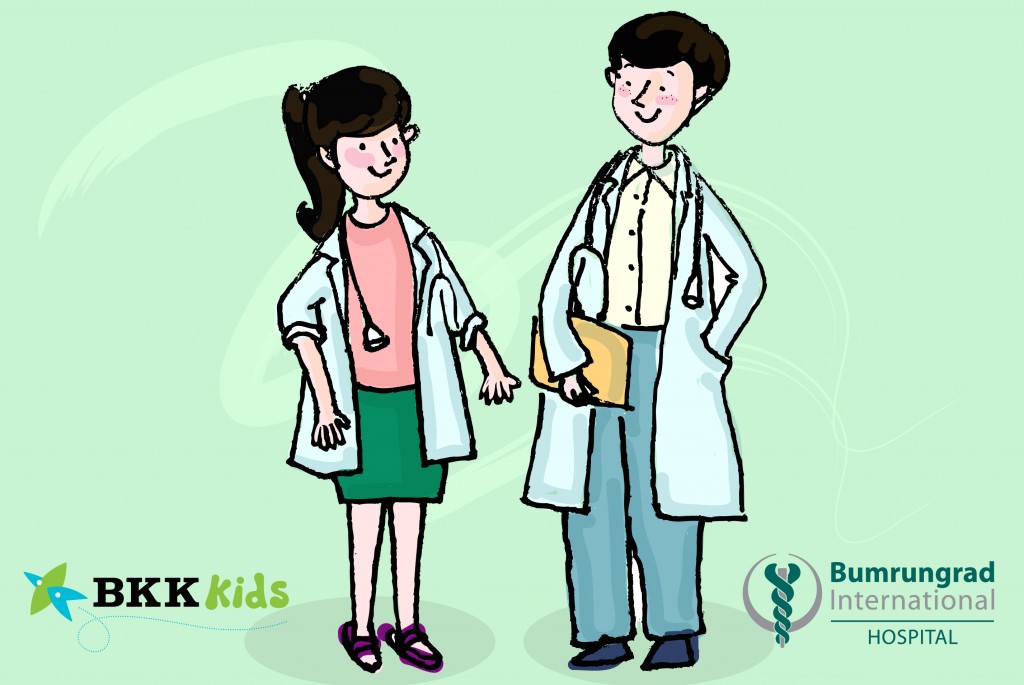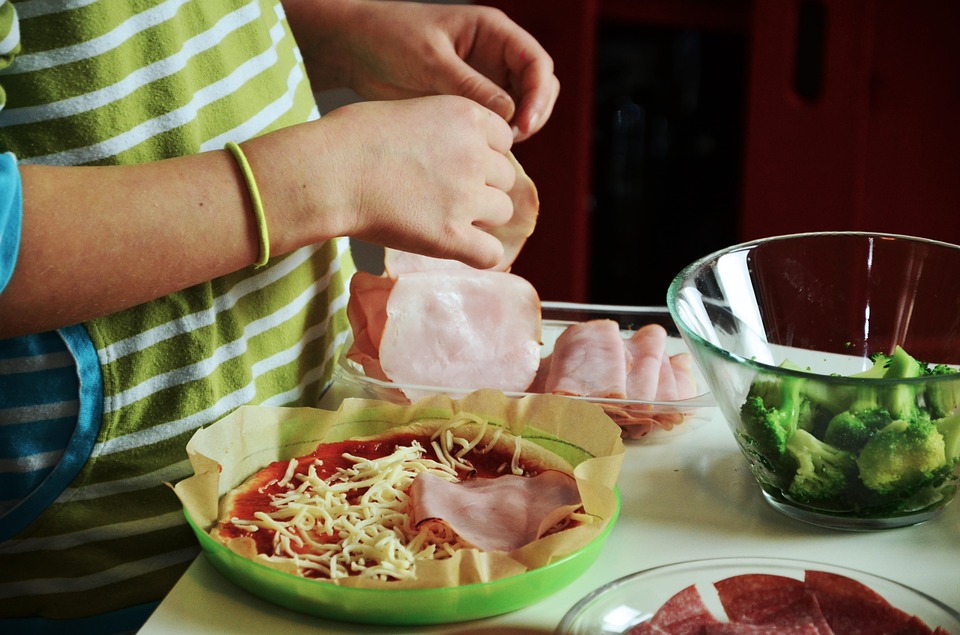As part of an ongoing series of articles with Bumrungrad International Hospital, we asked parents to submit family health related questions to us, to be addressed by the hospital’s Medical Coordination Office. Below is Part 4 of this series. Other parts can be accessed on our blog.
1. Our five-year old has a problem with bed wetting. He doesn’t drink after dinner and goes to the toilet right before bed. But he has an “accident” about 80 percent of the time. We were told he will outgrow it, but in the meantime, is there anything else we can do?
While most children stop bed wetting naturally by age three or four, it continues to be a problem for about 20 percent of five-year olds. As frustrating as it may be for parents, it’s important that you be supportive and reassuring with your son; let him know the problem is common and you’re confident he will overcome it.
These additional changes may help:
- Along with not drinking after dinner, consider shifting more of your son’s liquid consumption to earlier in the day while gradually reducing it during the afternoon. The more hydrated he is earlier in the day, the less thirsty he will be during the afternoon and evening.
- Eliminate citrus juices and drinks that contain caffeine, artificial flavorings, sweeteners or dyes, as these can irritate a child’s bladder.
- Put your son on a bathroom schedule so that he urinates every two to three hours and right before bedtime.
You might also consider getting your son a bed wetting alarm. The device has a moisture detector that triggers an alarm when he wets the bed. The process of being woken up right after bed wetting helps condition the brain to focus on bladder control. Studies have shown alarms are effective for about half the kids who use them.
Some cases of bed wetting can be traced to a physical cause, with constipation being a leading culprit. If your son isn’t having at least one bowel movement a day, or if his stool is hard, it’s recommended you arrange a consultation with your son’s pediatrician.
Your pediatrician can check for any underlying medical conditions, such as diabetes or an infection of the urinary tract, and discuss whether medication and other treatment options might help resolve your son’s bed wetting.
2. I stopped nursing two to three weeks ago and did not experience engorgement as my supply was running down anyway. But now one breast feels sore sometimes. Is this related to breastfeeding or should I see a specialist?
Milk production continues after breastfeeding has stopped, so it’s fairly common for moms to experience post-nursing breast soreness or discomfort.
These steps may prove helpful in your situation:
- Try releasing a small amount of milk from the sore breast, just enough until you feel more comfortable, and repeat the procedure if the soreness returns.
- Apply an ice pack to the sore breast for about 15 minutes every hour or two, but place a soft cloth over the breast first to keep your skin protected.
- Wear a snug-fitting bra, such as a sports bra or athletic bra.
If the soreness persists or gets worse, it’s recommended you see your doctor, as you may have a milk duct blockage, infection or other condition requiring treatment.
3. Is there any way to prevent bow-leggedness? My toddler walks like he is bow-legged, but I understand most toddlers look this way. When should I be concerned?
Bowing of the legs is absolutely normal in toddlers. In most cases, it’s caused by the positioning of the fetus inside the tight confines of the uterus — something that occurs naturally and isn’t preventable. The bowing tends to be most noticeable around six months of age, and the legs typically outgrow the condition and straighten out by the time the child is four or five years old, and occasionally up to eight years old.
The process takes longer for some children, but you should consult your pediatrician if:
- the bowing affects only one leg;
- your child experiences moderate to severe leg pain;
- the extent of the bowing appears extreme; or
- the bowing worsens over a short period of time.
Vitamin D is an essential nutrient for strong bones and a healthy skeletal system, so abnormal bowing may be a sign of rickets or another condition related to vitamin D deficiency. In a small number of cases, leg bowing may be a symptom of Blount’s disease, a growth disorder of the shin bone that causes bowing of one or both legs below the knee.
4. From a health standpoint, do you recommend using a baby carrier? I have one where the baby faces outwards (she weighs around eight or nine kilos), but it’s killing my back!
The use of baby carriers has grown hand-in-hand with the increasing popularity of “baby wearing” among new moms (and new dads, too).
Baby wearing keeps parent and baby physically close, which promotes emotional bonding. Baby wearing can also help new moms affected by post-partum depression to nurture their babies with minimal effort.
A baby carried often by a parent tends to be more calm, cries less and spends more time in a quiet, alert state that’s ideal for learning, socializing and mental development. And baby wearing even helps pre-mature infants grow faster.
When using a baby carrier, be sure to position the baby properly:
- Some baby carriers and other equipment may position the baby in a way that prevents healthy hip development.
- While in the carrier, the baby’s hips should be allowed to spread apart naturally, while its thighs are supported and its hips are bent (sometimes referred to as the jockey, straddle or frog position).
For parents using baby carriers, occasional back pain and soreness is quite common:
- While baby carriers are designed to distribute the baby’s weight evenly to reduce direct pressure on the back and spine, quality varies by brand and model, so you may have to try out several carriers to find the one that fits you best.
- Baby carriers make it much easier for a parent to be physically active, run errands or do household chores without being separated from their baby. But moving around while carrying the added weight of the baby means more strain on the back and spine, and a greater risk of injury when bending or lifting.
- In general, a forward-facing baby puts more strain on the back than an inward-facing baby.
Baby wearing shouldn’t cause significant or constant pain. If this is a new kind of pain that radiates to your lower extremities, and/or you’re starting to feel tingling and numbness, it may be the result of an injury or undiagnosed medical condition for which you need to see your doctor.
5. My seven-year old complains that his feet feel hot, especially at night, and even in air conditioned rooms. Is this something unusual or might there be a physiological explanation for this? Is there any reason for concern?
A hot or burning sensation in a child’s feet is a fairly common symptom with a wide range of possible causes, including:
- Athlete’s foot;
- Footwear-related, including wearing wet shoes, wearing poorly-fitting shoes, or an allergic reaction to shoes or socks;
- Vitamin B12 deficiency;
- Sensory peripheral neuropathy, a broad term for nerve damage or disease affecting nerves and potentially causing impaired sensations.
- Diabetes;
- Buerger’s disease or erythromelalgia, both rare but potentially serious vascular conditions; and
- Thrombocytopenia, a bone marrow disorder.
To get a clearer sense of your child’s health situation, you should arrange a consultation with your pediatrician. He or she will assess your child’s condition and recommend the best course of action to address it.
6. My 14-month old daughter has very large pieces of ear wax (so large that they cover the ear drum). I was told to just leave things alone and let the situation resolve itself. Can I do anything that might help?
Ear wax is natural and normal, and the amount of wax produced by your daughter’s ears shouldn’t be a cause for concern on its own:
- Ear wax (“cerumen”) is produced by glands located in the outer part of the ear canal. The wax helps protect and water-proof the skin that lines the ear canal.
- Producing more wax, or large pieces of wax, doesn’t lead to more ear infections.
- Ear wax is not dirty, and a large amount of ear wax is not a sign of poor hygiene.
- Our ear canals are self-cleaning; they push ear wax out naturally, helped by the movement of our jaws.
A wax blockage or build-up rarely happens by itself — cotton swabs are usually to blame. Cotton swabs are meant to be used only on the outside of the ear; inserting a swab into the ear can push the wax back inside the canal, making a blockage more likely.
At bath time, use a soft washcloth to gently wash the outer area of your daughter’s ears. And if you have questions or concerns, talk to your pediatrician. Children (and adults) with large volumes of ear wax may benefit from periodic ear cleanings.
Editor’s Note: This article is sponsored content from Bumrungrad International Hospital. It is intended as general information that may be useful for parents. It is not to be used as a substitute for professional medical advice, diagnosis, or treatment. Always seek the advice of your physician with any questions about a medical condition.
To submit a question to the next set of FAQs in this series, please fill out this online form.














